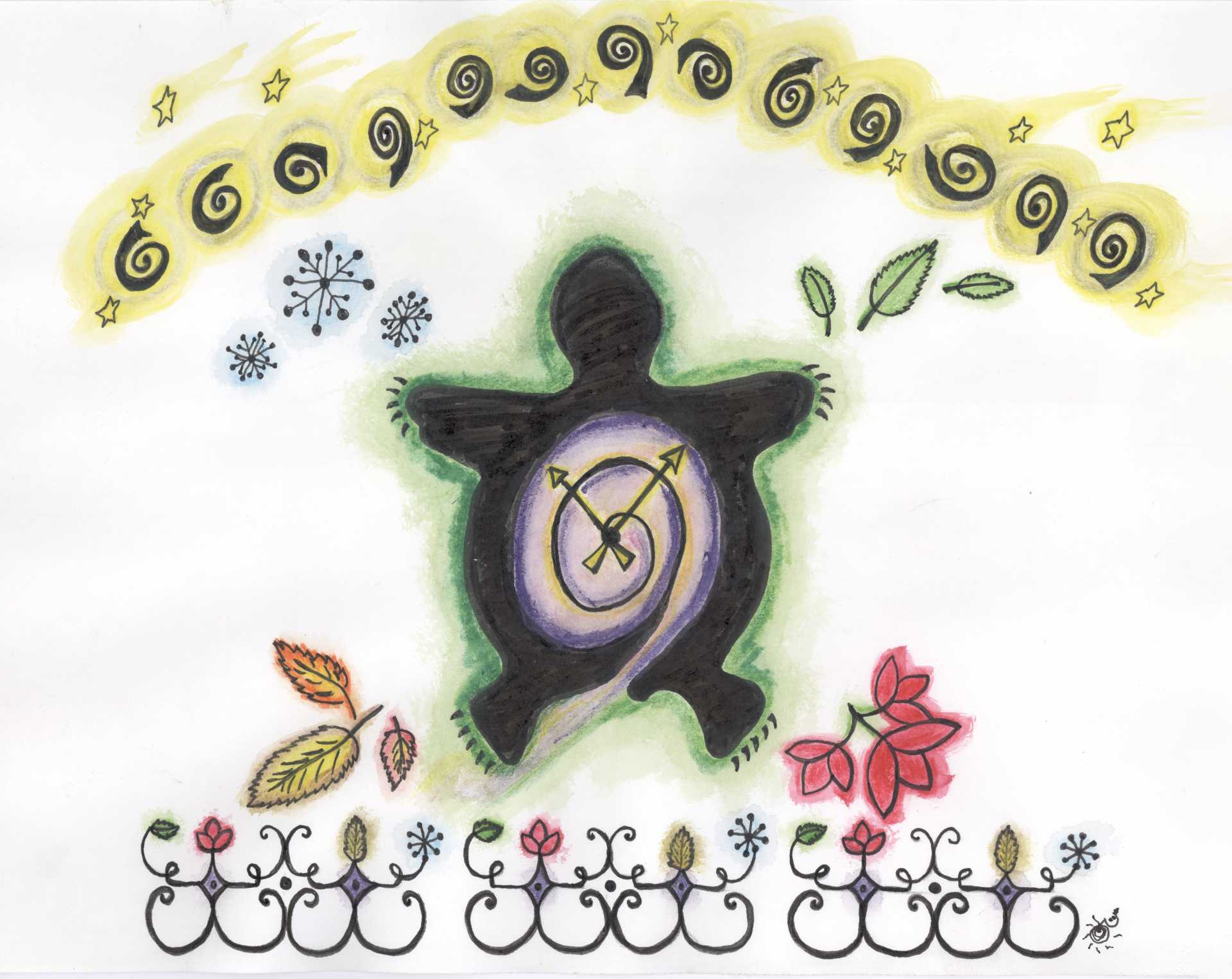


13 moons in movement illuminating us and guiding our steps ... the cycles of the seasons ... turtle, master and guardian of time ... and the green around it carrying a message of hope about the urgency of taking care of Mother Earth.
Home / Module 3 / Regarding the passing of time


‘Ktolonapemonuk mecimiw ‘t-uwehkahawal kisuhsol naka nipawselit ‘ci aciyak.

Our people used to measure time using the sun and moon.
Mec-ote pemkiskahk, kisuhsok liwiyak ewehkasik kisuhsuwey tan elokimut.

Still today, the names of our months are associated to the lunar calendar.
Kenuk, cuwi wewitahatomonen eli-wiywahtit ‘sanku nipawselit naka tehpu nisanku kisuhsok.

However, it should be noted that there are 13 moons in a year and only 12 calendar months.
Eliwiyut tehpu amuwi naka kat tahalu tan elokimucik kisuhsok.

The names are therefore estimates and don’t exactly correspond to the calendar months.
Ktolonapemonun cihkonaqc not tahalu kisuhsuwey tan elokimut ipocol mecimi-te ‘t-ihinol ‘sanku wolahqol wolokaskul.

Our ally the turtle is a symbol of the lunar calendar because it always has 13 scales on its shell.
Nit weci wot weyossis onsa Wikuwossit Skitkomiq naka Uhkomossuwi Kisuhs.

That’s why this animal represents both Mother Earth and Grandmother Moon.
 ⎙
⎙
| ‘Ciw aciyak etuciyewik | À propos du temps qui passe | Regarding the passing of time |


| |||
|---|---|---|---|---|---|---|
| Pemkiskahk | Aujourd’hui | Today |

|
|||
| Sepawonuk | Demain | Tomorrow |

|
|||
| Wolaku | Hier | Yesterday |

|
|||
| Wolaqiw | Soir | Evening |

|
|||
| Nipayiw | Nuit | Night |

|
|||
| Kotokilaku | Avant-hier | The day before yesterday |

|
|||
| Yut luhkan | Cette semaine | This week |

|
|||
| Kotoki luhkan | La semaine dernière | Last week |

|
|||
| Apc luhkan | La semaine prochaine | Next week |

|
|||
| Yut kisuhs | Ce mois-ci | This month |

|
|||
| Cossolewi kisuhs | Le mois dernier | Last month |

|
|||
| Apc kotok kisuhs | Le mois prochain | Next month |

|
| Pemoluhkemkil | Jours de la semaine | Days of the week |


| |||
|---|---|---|---|---|---|---|
| Sonte | Dimanche | Sunday |

|
|||
| Kissonte | Lundi | Monday |

|
|||
| Nis luhkan | Mardi | Tuesday |

|
|||
| Nihi luhkan | Mercredi | Wednesday |

|
|||
| New luhkan | Jeudi | Thursday |

|
|||
| Skehewahtoq | Vendredi | Friday |

|
|||
| Kotuwahsonte | Samedi | Saturday |

|
| Minuwokehkims wici papehcikesuwakonol naka asitewtomuwakonol. | Entraîne-toi avec des questions et des réponses. | Practice with questions and answers. |


| |||
|---|---|---|---|---|---|---|
| Keq pemkiskahk? | Quel jour sommes-nous aujourd’hui? | What day is it? |

|
|||
| Pemkiskahk nisluhkan. | Aujourd’hui, c’est mardi. | Today is Tuesday. | ||||
| Keq wolaku? | Nous étions quel jour hier? | Quel jour était hier? |

|
|||
| Wolaku kissonte. | Hier, c’était lundi. | Yesterday was Monday. |
| Tayuwek kpeci? | Quand rentres-tu à la maison? | When will you come home? |


| |||
|---|---|---|---|---|---|---|
| Npeci-oc sepawonuk kisi-pasqek. | Je reviens à la maison demain après-midi. | I will come home tomorrow afternoon. |

|
|||
| Npeci oc apc neqt luhkan. | Je reviens à la maison la semaine prochaine. | I will come home next week. |

|
|||
| Npeci-oc sqehewahtqik. | Je reviens à la maison vendredi. | I will come home on Friday. |

|
| Tayuwek kmacaha? | Quand pars-tu? | When are you leaving? |


| |||
|---|---|---|---|---|---|---|
| Nmacaha miyahs. | Je pars tôt. | I will leave early. |

|
|||
| Nmacaha nokosayiw. | Je pars bientôt. | I will leave soon. |

|
|||
| Nmacaha oc neqt lukhan. | Je pars la semaine prochaine. | I leave next week. |

|
|||
| Nmacaha pemolaqik. | Je pars ce soir. | I will leave tonight. |

|
| Keq pessaqhek musikisqok | Ce qui brille dans le ciel | What shines in the sky |


| |||
|---|---|---|---|---|---|---|
| Kisuhs | Soleil | Sun |

|
|||
| Nipawset | Lune | Moon |

|
|||
| Possesom(ok) | Étoile(s) | Star(s) |

|
|||
| Kisuhsuwiw pemkiskahk. | Il fait soleil aujourd’hui. | It is sunny today. |

|
|||
| Ckuwye yut oloqiw kisuhs. | Le soleil vient par ici. | The sun shines this way. |

|
|||
| Nomiya nmitahqsuwi kisuhs sepay. | Je vois notre père le soleil ce matin. | I see our father the sun this morning. |

|
| Minuwokehkims wici papehcikesuwakonol naka asitewtomuwakonol. | Entraîne-toi avec des questions et des réponses. | Practice with questions and answers. |


| |||
|---|---|---|---|---|---|---|
| Knomiya kisuhs? | Vois-tu le soleil? | Do you see the sun? | ||||
| Aha. Nomiya kisuhs. Kisuhsuwiw yut sepay. | Oui. Je vois le soleil. C’est ensoleillé ici aujourd’hui. | Yes. I see the sun. It is sunny here this morning. |

|
|||
| Knomiya nipawset? | Vois-tu la lune? | Do you see the moon? | ||||
| Aha. Nomiya nipawset. | Oui. Je vois la lune. | Yes. I see the moon. |

|
|||
| Nomiya nuhkomossuwi nipawset pemolaqik. | Je vois grand-mère la lune ce soir. | I see Grandmother Moon tonight. |

|
|||
| Knomiyak possesomok? | Vois-tu les étoiles? | Do you see the stars? | ||||
| Nomiyak nmossisuwi possesomok pemolaqik. | Je vois nos sœurs les étoiles cette nuit. | I see our sisters the stars tonight. |

|
| ‘Ci elkiskahk -Weather related | Par rapport à la température | With respect to weather |


| |||
|---|---|---|---|---|---|---|
| Aluhk(ol) | Nuage(s) | Cloud(s) |

|
|||
| Aluhkot. | C’est nuageux. | It is cloudy. |

|
|||
| Aluhkot yut pemkiskahk. | C’est nuageux ici aujourd’hui. | It’s cloudy here today. |

|
|||
| Komiwon. | Il pleut. | It’s raining. |

|
|||
| Wocawson | Le vent | The wind |

|
|||
| Mace… | Il commence à… | It’s starting to … |

|
|||
| Ehqi... / Mehci…Ehqi... / Mehci… | Il vient d’arrêter de… | It stopped … |

|
|||
| Komiwon yut pemkiskahk. | Il pleut ici aujourd’hui. | It’s raining here today. |

|
|||
| Koti-komiwon. | Il va bientôt pleuvoir. | It’s going to rain. |

|
|||
| Petakiyik | Tonnerre | Thunder |

|
|||
| Psaninaqot. | On dirait qu’il va neiger. | It looks as if it’s going to snow. |

|
|||
| Psan | Il neige. | It’s snowing. |

|
|||
| Wast | Neige au sol | Fallen snow |

|
|||
| Ktanaqsu yut wast. | Il y a beaucoup de neige au sol. | There is a lot of snow on the ground. |

|
|||
| Wocawson | Le vent | The wind |

|
|||
| Tolamsom (wocawson). | Il vente. | It’s windy. |

|
|||
| Wisokolamson pemkiskahk. | Il vente beaucoup aujourd’hui. | It’s really windy today. |

|
|||
| Macelamson tokec. | Il commence à venter maintenant. | The wind is starting to blow now. |

|
|||
| Monoqan | Arc-en-ciel | Rainbow |

|
|||
| Monoqan wolinaqot | L’arc-en-ciel est beau. | The rainbow is beautiful. |

|
| Minuwokehkims wici papehcikesuwakonol naka asitewtomuwakonol. | Entraîne-toi avec des questions et des réponses. | Practice with questions and answers. |


| |||
|---|---|---|---|---|---|---|
| Komiwon tokec? | Est-ce qu’il pleut maintenant? | Is it raining now? | ||||
| Ontama. Mehtolan. | Non. Il a arrêté de pleuvoir. | No. It stopped raining. |

|
|||
| Aha. Macelan. | Oui. Il a commencé à pleuvoir. | Yes, it started to rain. |

|
|||
| Ontama. Ma-te komiwonu. | Non. Il ne pleut pas. | No. It’s not raining. |

|
|||
| Knutuwak petakiyik? | Entends-tu le tonnerre? | Do you hear the thunder? | ||||
| Aha. Nutuwak petakiyik. | Oui. J’entends le tonnerre. | Yes. I hear the thunder. |

|
|||
| Aha. Mace petakiw. | Oui. Il commence à tonner. | Yes. It is starting to thunder. |

|
|||
| Ontama. Ma-te nutuwawiyik petakiyik. | Non. Je n’entends pas le tonnerre. | No. I don’t hear the thunder. |

|


| ||||||
|---|---|---|---|---|---|---|
| Petakiw tokec? | Est-ce qu’il tonne? | Is it thundering? | ||||
| Aha. Mace petakiw. | Oui. Il a commencé à tonner. | Yes. It started to thunder. It is starting to thunder. |

|
|||
| Ontama. Ma-te petakiw. | Non. Il ne tonne pas. | No. It isn’t thundering. |

|
|||
| Toli psan tokec? | Est-ce qu’il neige maintenant? | Is it snowing now? | ||||
| Ontama. Ma-te toli psanu. | Non. Il ne neige pas. | No. It is not snowing. |

|
|||
| Aha. Mace psan. | Oui. Il commence à neiger. | Yes. It is starting to snow. |

|
|||
| Ontama. Mehci psan. | Non. Il a arrêté de neiger. | No. It stopped snowing. |

|
|||
| Knomihtun monoqan? | Vois-tu l’arc-en-ciel? | Do you see the rainbow? | ||||
| Aha. Nomihtun monoqan. Komiwon naka tettpi-te kisuhsuwiw. | Oui. Je vois l’arc-en-ciel. Il pleut et il fait soleil en même temps. | Yes. I see the rainbow. It’s raining and sunny at the same time. |

|